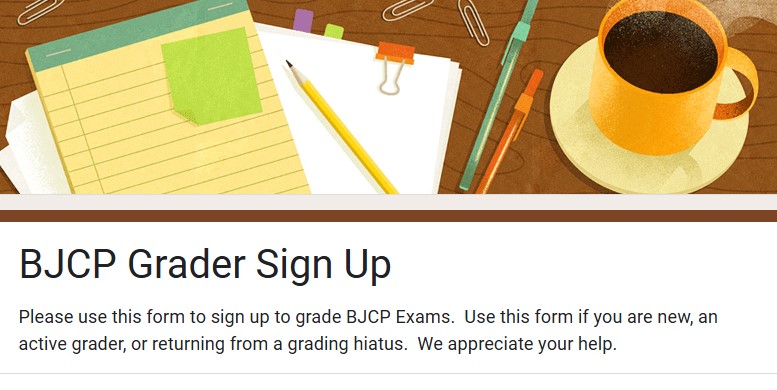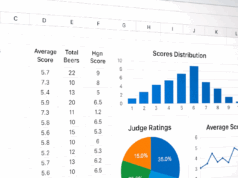I was ultimately given the title of National by the BJCP at the end of 2023. Because I was so annoyed by the unusually long time it takes to get the results of a BJCP exam, I applied to be a grader right away.
I reasoned that rather than merely complaining, it could be more helpful to really assist in getting things done.
I had no idea that grading exams is a great method to learn more about the BJCP and beer in general. I’m glad I decided to become a grader. I’ll keep supporting the BJCP, and I encourage other National judges to follow suit.
How to become a BJCP grader
All graders should be at least National BJCP beer judges. Accordingly, you ought to have received an 80+ on the Tasting Exam. You must next take the written exam and receive an average score of 80 or more, which is determined by averaging the scores from the Tasting and the Written exam.
I wrote a lot about both exams in the BJCP section of this blog.
After that, you need to take the graders’ online course (here). Don’t expect much from it, because the training is a bit outdated and not very informative. There is an official guide to grading the scoresheets (here), and there are a few YouTube videos that might ease out the learning process (such as this one).
After that, the best thing to do is to apply online (here) and wait to be allocated a set. You will work with a Lead Grader when a set arrives. The Lead Graders I met were really kind and knowledgeable, and they really helped me with my first sets.
How it will make you a better beer judge
Most judges believe that grading exam sets is tedious and not the best way to spend your time as a BJCP National judge. Even though it might be tiresome, especially when there are a lot of examinees in the set—12 or more—I always learn something new in the process. This assignment will truly help if tackled with the right mindset.
I honestly believe that exam grading is beneficial and, for the most part, enjoyable for a few reasons.
It will broaden your beer sensory vocabulary
A master BJCP judge should be able to briefly and accurately describe the beer’s sensory profile using relevant descriptors. Even native speakers find it challenging to perfect this skill, let alone non-native speakers like me.
Reading a lot is one way to increase your beer vocabulary. This is helpful, but when written for the general audience, beer descriptions might be overly pretentious. All too frequently, they make reference to unusual fruits or rare flowers that tickle the imagination but are not best suited for a down-to-earth analysis of the beer.
Writing a simple, unassuming description of the beer without being overly basic is challenging. This is a skill that will develop over time.
Reading the proctor’s scoresheets that come with an exam set is a valuable source of vocabulary and a valid learning tool to improve your descriptive ability. It is the proctors’ responsibility to provide the graders with a brief but effective description of the beer. This is a skill that a BJCP judge should master in order to deliver outstanding scoresheets.
Not all exam scoresheets—including those from the proctors—will always be that excellent. Reading poor scoresheets, on the other hand, will undoubtedly let you see clearly what not to do.
After grading a few sets, you will soon be able to tell apart the scoresheets that fulfill this quality and start learning how to write them yourself.

You’ll get in touch with more experienced judges
One of the things that I like most about the BJCP is the sense of community. I developed a number of close relationships with fellow BJCP judges both in Italy and elsewhere throughout my seven years as a judge.
I can vividly recall the first time I traveled to London to judge a competition outside of Italy. On that occasion, I gave a CEP (the BJCP Continuous Education Program) talk about stouts. In the years following that day, I had the opportunity to meet again and have drinks and great talks with the London-based judges I connected to thanks to the BJCP.
This chance is extended as a BJCP grader. You are paired with a more experienced BJCP judge (the Lead Grader) each time you grade a set of exams. You will grade the set on your own, but at the end of the process, the two graders will discuss and share the scores they gave each participant in order to come to a consensus. There are rules to follow that can be accessed by everyone (here), but every grader perfects his own approach to grading over time.
Most of the time, this thought-sharing occurs over a few days via email. You will continue to (virtually) meet the same people after grading for a few months. The bond becomes stronger.
During my first few months of grading, I connected with several amazing judges and learned a lot about beer tasting, grading, and the BJCP in general.
This isn’t always the case, of course. Some graders are not very interested in exchanging thoughts at the end of the grading process, especially if the scores are close. However, I’m very sure that this is the exception rather than the rule.
You will get down-to-earth perspective on beer evaluation
Beer evaluation is not a perfect science. Most of it relies on our senses, and they strongly rely on our brain. Judges and proctors are not machines; they can smell and taste different flavours and aromas in the same beer. It happens more often than one would think.
Experience and practice tend to level out perception differences, but they will always be there.
When judging in a competition with another judge at the same table, this doesn’t come up very often. The fact that both judges are working together towards a consensus score reduces the gaps in perception. After discussing the beer, one judge will easily raise his score by two or three points, while the other will lower his score by two or three points. Before long, the final scores only differ by three points.
That’s fantastic!
Is it? When you consider it, the initial scores were most likely separated by approximately ten points. But when the judging is over, you most likely don’t realize it.
It was a great day. We were quite aligned!
But you were not.
You may encounter many situations like this when grading a set of exams, as you read completely different perspectives on the same beer. This is typical among examinees, but it also occurs rather regularly among proctors.
Are they mistaken? Maybe, sometimes; but—more often than not—no one is really wrong. You just have a difference in perception that must be taken into account when grading an exam.
This kind of analysis is really insightful. It forces you to delve into beer flaws, aromas and flavours. With each set that I grade, my knowledge about beer deepens. I wouldn’t have thought that, but it is happening.






Great post! Learned something new today😄
Glad to hear it!
Hey Frank,
Vence here again. I’m preparing for my upcoming tasting exam with the goal of scoring 92+ while grading, and I have a question that’s been bothering me both as an examinee and as a grader.
In the BJCP Scoresheet Guide, under the “Completeness and Communication competencies”, item 5 (2 points) states that “the Overall Impression section should include a comment on overall drinking pleasure…”
My question is how to best address drinking pleasure when evaluating a faulty beer that is not particularly enjoyable to drink. For example, a beer scoring in the 20–25 range, which is fairly common on the exam. According to the scoresheet descriptors, beers in the 20–29 range are described as “good.” In that case, if I begin my Overall Impression with “A good beer with some flaws and stylistic issues,” would that be considered an adequate comment on drinking pleasure?
Thanks in advance for your guidance.
“Overall drinking pleasure” can also have a negative connotation if the beer is not pleasant to drink. Obviously, this should be expressed politely, for example: “Overall, the beer is not bad, but it is somewhat difficult to drink.” In my opinion, “Good beer” does not really convey the idea of drinking pleasure.
I would also add that, in my opinion, the legend of the scoresheet in the bottom left should be interpreted with some caution. In this context, “Good” should be interpreted as “overall drinkable,” but I would not generally describe a beer that scores 25/50 as “good”.
Vence here again. Another quick question:
After finishing grading one assignment, if I want to grade the next set, should I go to the sign-up Google doc and fill my information once again, or should I just wait for the next assignment?
Thanks!
You should fill in the sign-up Google form.